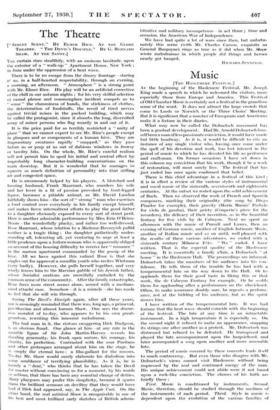The Theatre
[" STREET SCENE." BY ELMER RICE. AT THE GLOBE. THEATRE. "THE DEVIL'S DISCIPLE." BY G. BERNARD SHAW. AT THE SAVOY.] THE curtain rises stealthily, with an ominous lassitude, upon the exterior of a " walk-up " Apartment House, New York ; in June under the oppression of a heat wave.
There is to be no escape from the dreary frontage—staring at -us, in a half-hearted respectability, through an evening, a morning, an afternoon. " Atmosphere " is a strong point with Mr. Elmer Rice. His play will be an artificial corrective of the chill in our autumn nights ; for his very skilful selection of casual phrase and commonplace incident compels us to sense " the clamminess of hands, the stickiness of clothes, the deterioration of foodstuffs, the recoil of tired nerves against trivial noises in the packed building, which may be called the protagonist, since it absorbs the long, diversified array of minor persons who flag wearily in and out of it.
It is the price paid for so terribly restricted a " unity of place " that we cannot expect to see Mr. Rice's people except in glimpses and as components of a human hive. They are fragmentary creatures rapidly " snapped," as they pass before us or peep at us out of dubious windows in frowsy or tawdry bits. On the whole, Mr. Rice's careful realism will not permit him to spoil his initial and central effect by improbably long character-building conversations on the main doorstep. But it is wonderful that he manages to squeeze so much definition of personality into that stifling air and congested. space.
He is .enormously helped by his players. A blotched and boozing husband, Frank Maurrant, who murders his wife and her lover in a fit of passion provoked by boot-legged liquor, becomes a pitiable animal, as Mr. David Landau faithfully shows him—the sort of " strong " man who exercises a loud control over everybody in his family except himself, and makes fierce intermittent efforts to play the good father to a daughter obviously exposed to every sort of street peril. Here is another admirable performance by Miss Erin O'Brien- Moore—the wonderfully plucky, and rather too well-dressed, Rose Maurrant, whose relation to a Madame-Bovaryish pallid mother is a tragic thing : the daughter pathetically under- standing all, tolerating all, yet venturing to urge at least a little prudence upon a forlorn woman who is apparentlyobliged on account of the housing difficulty to receive her romance " in the narrow apartment conunanded by the gossip of the hive. All we have against this valiant Rose is that she singles out for approval a maudlin youth who recites Whitman (very badly). However, she pulls herself together, and very wisely leaves him to the Marxian gabble of his Jewish father, whose Socialist orations are mercifully curtailed by the common sense of the community. After the family catastrophe, Rose faces more street scenes alone, armed with a medium- sized attache case. Somehow—it is a miracle—she has made us feel that she will win through.
Seeing The Devil's Disciple again, after all these years, one is amusingly reminded that there was, long ago, a primeval, pre-Shavian and almost human Shaw. One sees the discur- sive moralist of to-day, who appears to be his own great- grandson, rewriting this innocent melodrama.
The bad man in it, the riotous swaggering Dick Dudgeon, is an obvious fraud. One glance at him—at any rate in the amiable figure of Sir John Martin-Harvey—reveals his dazzling generosity, his frank open nature, his courage, his charity, his perfection. Contrasted with the sour Puritans and other grotesques arranged about him on the stage, he is simply the eternal hero : a film-gallant for the masses. To-day Mr. Shaw would surely elaborate his diabolism into some semblance of terrifying plausibility. As it is, he is merely a " dear," who thinks that he has taken the Devil for master without 'convincing us for a moment, by his words or actions, that there has been any essential change of deities. Many playgoers may prefer this simplicity, beeause it spares (bent the brilliant sermons on deviltry that they would have had if Dick had.appeared, say, in The Apple Carl. On the other hand, the real satirical Shaw is recognizable in one of his best and most brilliant early sketches of British admin. istrative and military incompetence—in act three ; time and occasion, the American War of Independence.
We have had quite a lot of wars since then, but unfortu- nately this scene (with Mr. Charles Carson, exquisite as General Burgoyne) rings as true as it did when Mr. Shaw wrote melodramas in which people did things and heroes nearly got hanged.
IlictiAnn JENNINGS.


































 Previous page
Previous page